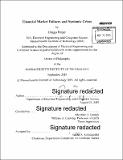Financial market failures and systemic crises
Author(s)
Feijer, Diego (Diego Francisco Feijer Rovira)
DownloadFull printable version (8.481Mb)
Other Contributors
Massachusetts Institute of Technology. Department of Electrical Engineering and Computer Science.
Terms of use
Metadata
Show full item recordAbstract
This thesis contributes to the theoretical literature that studies the macroeconomic implications of financial frictions. It develops frameworks to address different financial market failures, and evaluate preventive policies to mitigate the vulnerability of the economy to costly systemic crises. First, it identifies a credit risk (fire sale) externality that justifies the macroprudential regulation of short-term debt to mitigate the probability of systemic bank runs. Without regulation, banks do not internalize how their funding decisions affects the terms at which other market participants can obtain credit. The formal welfare study conducted, provides a general equilibrium notion of systemic risk that captures both fundamental insolvency and illiquidity risk. It also connects this measure with the optimal Pigouvian (corrective) tax. Second, it shows that liquidity crises may arise as the result of endogenous information panics. It finds that collective ignorance is welfare maximizing but it is fragile, susceptible to self-fulfilling fears about asymmetric information. Adverse selection may thus obtain in equilibrium, sustained by negative aggregate expectations. The mechanism that gives rise to multiple equilibria is robust to the introduction of noisy private signals, and warrants the regulation of information acquisition for rent-seeking (speculative) motives. Finally, it demonstrates the limitations of unconventional credit easing policies to stimulate lending during market-freezes. With inter-temporal investment complementarities, credit to non-financial firms may be curtailed as the result of dynamic coordination failures. Interest rate cuts mitigate coordination risk, but increase the average duration of credit market freezes when the productivity of capital is high. Capital injections in the banking sector, or direct lending to non-financial firms, are completely ineffective, because reductions in deposits from households crowd out government spending. In contrast, government guarantees improve welfare by reducing strategic uncertainty.
Description
Thesis: Ph. D., Massachusetts Institute of Technology, Department of Electrical Engineering and Computer Science, 2015. Cataloged from PDF version of thesis. Includes bibliographical references (pages 97-103).
Date issued
2015Department
Massachusetts Institute of Technology. Department of Electrical Engineering and Computer SciencePublisher
Massachusetts Institute of Technology
Keywords
Electrical Engineering and Computer Science.